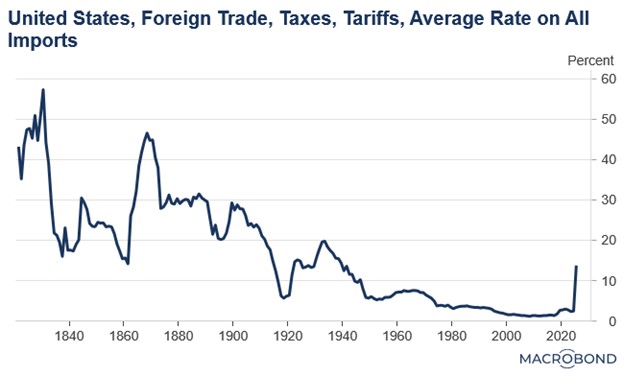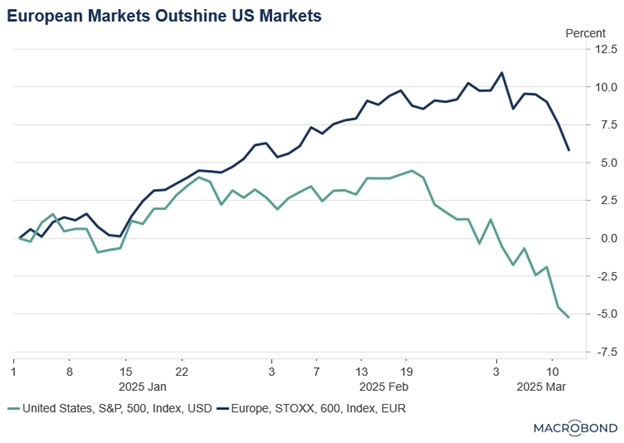Daily Comment (March 12, 2025)
by Patrick Fearon-Hernandez, CFA, and Thomas Wash
[Posted: 9:30 AM ET] | PDF
Good morning! Markets are digesting the latest inflation data. In sports, Gonzaga clinched a victory over Saint Mary’s in the West Coast Conference Finals. Today’s Comment will cover key developments, including the ongoing US-Canada trade tensions, Ukraine’s proposed 30-day ceasefire, and other market-moving stories. As always, the report will also feature a summary of recent domestic and international economic data releases.
Tariff Uncertainty: US equities swung sharply on Tuesday amid fears of a US-Canada trade war. The S&P 500 briefly dipped into correction territory, rebounded, then fell again as trade concerns lingered, keeping markets on edge.
- Market volatility surged as tensions escalated between the US and Canada over retaliatory tariffs. The day began with President Trump imposing 50% tariffs on Canadian steel and aluminum products as a response to Ontario’s threat of a 25% surcharge on electricity exports to Michigan, Minnesota, and New York. The standoff eased after Ontario agreed to drop the surcharge in exchange for a meeting with the US Secretary of Commerce Howard Lutnick to discuss the USMCA trade agreement.
- Following the arrangement, President Trump scaled back the tariff on Canadian steel from 50% to 25%, alleviating some market concerns but failing to fully ease fears over ongoing trade uncertainty. While Ontario has withdrawn its electricity surcharges, Canada has opted to maintain its tariffs on US goods and has signaled that it will only reconsider once it believes the Trump administration is prepared to be respectful in its approach. The situation remains fluid, leaving markets wary of further developments.
- At midnight, universal tariffs on aluminum and steel products were imposed without exemptions, marking a significant escalation in trade policy. The European Union retaliated with its own tariffs that are expected to take place mid-April, while the UK is expected to maintain its current stance and refrain from immediate action. Meanwhile, Chinese tariffs on US agricultural products have also gone into effect.
- The ongoing trade war is expected to keep equities highly vulnerable to midday swings, as investors attempt to assess the potential economic impact of tariffs. While there have been preliminary signs of an economic slowdown — such as major airlines reporting weaker demand for both leisure and business travel — these indicators remain anecdotal. For now, there is no concrete evidence of a broader economic downturn, but the uncertainty continues to weigh on market sentiment.
Ukraine Peace Deal: US officials successfully persuaded Ukraine to back a ceasefire agreement with Russia. Although the deal still requires Putin’s approval, it includes provisions for the US to share military intelligence with Ukraine and restore military aid, underscoring the continued strong relationship between the two nations.
- The proposal outlines a 30-day ceasefire that would encompass the entire front line, expanding beyond the initially proposed restrictions on air and sea operations. This development comes at a critical juncture, as Ukraine’s recent territorial losses in Russia’s Kursk region have weakened its negotiating position, diminishing a key bargaining chip tied to territorial control. The agreement represents a potential shift in the conflict’s dynamics, though its broader implications remain uncertain.
- With Ukraine agreeing to the ceasefire, the focus now shifts to Moscow. Russian President Vladimir Putin has consistently justified the continuation of the war as a means to achieve the country’s long-term strategic goal of preventing NATO expansion near its borders. While the conflict has likely stalled Ukraine’s bid to join the military alliance, Russia has yet to secure full control of the Donbas region — a key objective that would mark a significant success in its campaign.
- That said, the ceasefire agreement signals a potentially positive development, suggesting that the Russian invasion may be nearing its conclusion. This would be a significant boost for risk assets, particularly in Europe, as the resolution of the conflict could pave the way for the return of Russian energy supplies to the global market. Such a scenario would likely accelerate Europe’s efforts to revitalize its industrial sector, with Germany standing to benefit considerably.
Shutdown Avoided: The House of Representatives has passed a bill to fund the government for the next seven months. The legislation is now headed to the Senate, where it is expected to pass with bipartisan support, as Democrats are likely to back the measure to ensure government operations continue uninterrupted.
- The proposed legislation, featuring a $6 billion boost to defense spending, additional funding for border security, and a $13 billion reduction in non-defense programs, has become a lightning rod for controversy. Republican lawmakers argue that the bill fails to adequately address government overspending, while Democrats express deep concern over the targeted cuts to crucial programs they are aiming to protect.
- While the bill ultimately passed, the vote was not without its share of drama, as there were defections in both the Republican and Democrat camps. Notably, conservative Kentucky Representative Thomas Massie, a staunch deficit hawk, voted against the measure, while Maine Democrat Jared Golden broke ranks with his party to support it. This lack of unity on both sides underscores emerging intraparty tensions, suggesting that ideological and strategic rifts may be deepening within each camp.
- The interparty divisions appear to be more pronounced within the Democratic Party, as lawmakers continue to grapple with the shifting political landscape following Trump’s victory. While many Senate Democrats view the stopgap bill as insufficient, they are reluctant to oppose it outright, fearing the potential fallout from a government shutdown.
- The passage of the budget resolution to fund the government through the rest of the year is likely to set the stage for a more contentious battle over the president’s tax bill. While Republicans have largely supported the measure, there is increasing pressure within the party to ensure the bill is as deficit neutral as possible. On the other side, Democrats remain united in their efforts to shield key programs from cuts, though it is evident that many are open to compromise. The passage of a tax bill this year seems highly likely.
Greenland Speaks: The center-right Demokraatit Party secured a surprising victory, as voters demonstrated strong support for the region’s independence. This outcome followed controversial overtures from Trump, who had previously expressed interest in acquiring the territory from Denmark.
- The Demokraatit Party was not the only pro-independence group to experience a surge in support, as the Naleraq Party also secured a strong second-place finish. Their successes underscore the depth of voter concern over the perceived threat of US annexation and highlight a growing desire among the electorate to have a greater say in shaping the region’s future.
- That said, it is important to note that the election results also revealed a preference among voters for a more gradual approach to independence, indicating that the population is not yet ready to fully sever ties with Denmark. While support for pro-independence parties has grown, the cautious pace advocated by some factions suggests a desire to balance aspirations for self-determination with the stability and benefits provided by the current relationship with Denmark.




